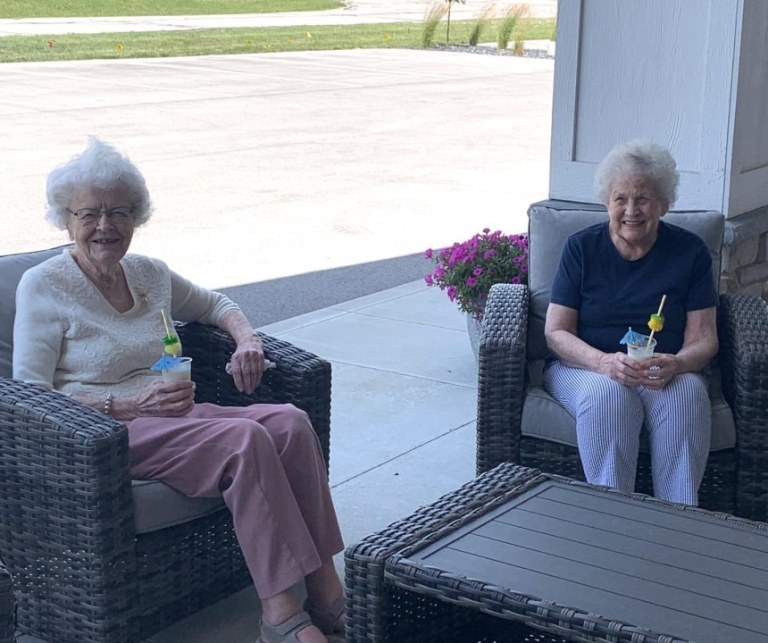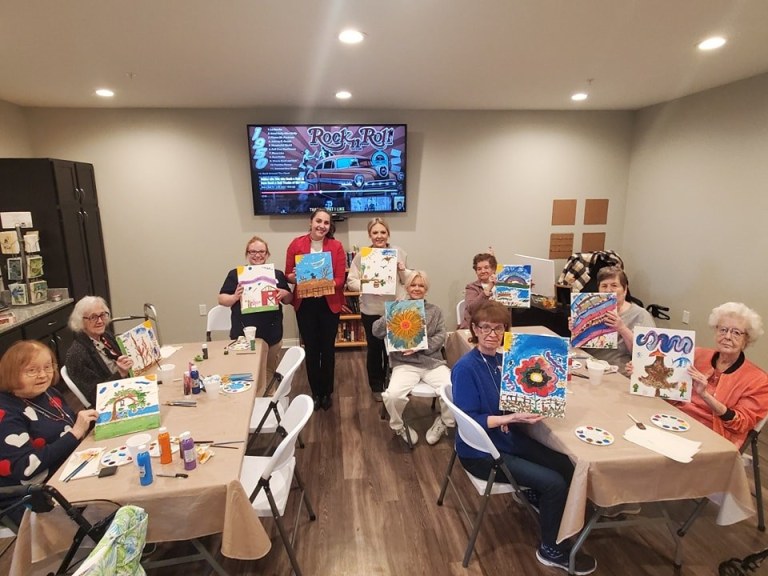When exploring personalized care in assisted living, you’ll find it’s all about meeting your unique needs with compassion. It focuses on your individual health, preferences, and routines, creating tailored care plans that evolve as your needs change. This approach boosts your emotional well-being, fosters belonging, and enhances your quality of life through meaningful connections. Staff work closely to guarantee your comfort and dignity. Stick around to uncover more about this nurturing experience.
Key Takeaways
- Personalized care in assisted living tailors support to each resident’s unique needs and preferences.
- It enhances emotional well-being by fostering trust and meaningful connections.
- Tailored care plans address health conditions, hobbies, and evolving needs.
- Benefits include improved health outcomes and reduced feelings of isolation.
- Staff face challenges like resource limitations and balancing efficiency with individual care.
Understanding the Concept of Personalized Care
Compassion lies at the heart of personalized care in assisted living. When you seek a place like assisted living near me, you’re looking for a community that sees your loved one as unique.
It’s about tailoring support to their needs, ensuring they feel valued and understood every day. Your desire to serve shines through when you choose a facility that prioritizes individual dignity.
In places like assisted living Columbia City, caregivers focus on building meaningful connections.
At senior assisted living Columbia City, staff listen to residents’ stories and preferences, crafting daily experiences that honor who they are. This commitment to holistic approach to care ensures that every aspect of well-being is considered.
You’re not just finding a home; you’re ensuring a nurturing environment where personal attention transforms lives with kindness and respect.
Why Individualized Support Matters in Assisted Living
Building on the idea of tailored care, let’s explore why individualized support truly makes a difference in assisted living. When you serve seniors, you’re not just meeting basic needs; you’re enriching lives with personal attention.
Each resident in elderly living Columbia City has unique stories, preferences, and challenges. By focusing on individualized support, you guarantee they feel valued and understood, fostering dignity and comfort.
Every resident in elderly living Columbia City brings unique stories and needs. Individualized support ensures they feel valued, promoting dignity and comfort.
Imagine the impact of knowing someone’s favorite activities or dietary needs—small gestures that build trust. As a caregiver, you’ll see how this approach enhances emotional well-being and strengthens community bonds. Providing personalized care plans that evolve with changing needs is essential to ensuring each resident receives the best possible support.
Your dedication to personalized care transforms a facility into a true home, making every day brighter for those you serve with compassion.
Key Elements of a Tailored Care Plan
While personalized care sets the foundation for quality assisted living, crafting a tailored care plan guarantees each resident’s specific needs are met. As someone dedicated to serving others, you’ll want to focus on key elements that make these plans effective.
Start by evaluating individual health conditions, preferences, and daily routines to create a roadmap for support.
Next, make certain you include specific medical needs, like medication schedules or therapy sessions, alongside personal interests, such as hobbies or social activities.
Don’t forget to involve family members for insights and emotional support.
Finally, regularly review and adjust the plan with staff to address changing needs. By prioritizing these elements, you’re empowering residents with care that truly fits their unique lives. Additionally, fostering social engagement through tailored activities can significantly enhance a resident’s overall well-being.
How Personalized Care Enhances Quality of Life
As you immerse yourself in the impact of personalized care, you’ll quickly see how it transforms lives in assisted living. It’s about meeting individual needs with compassion, ensuring each person feels valued and understood.
You’ll notice how tailored support boosts emotional well-being, fostering a sense of belonging and dignity for residents.
When you help create a care plan that respects personal preferences, you’re enhancing physical comfort and mental peace. Whether it’s assisting with daily tasks or encouraging social connections, your dedication makes a difference.
Personalized care builds trust, empowering those you serve to live fuller, happier lives. By focusing on what matters most to each individual, you’re not just providing help—you’re enriching their entire experience. Additionally, community design plays a crucial role in creating a safe and welcoming environment that enhances overall well-being.
Assessing Your Needs for Customized Assistance
How do you determine the right level of support for your unique situation in assisted living? Start by honestly evaluating your daily needs.
Consider your physical abilities—do you struggle with mobility or personal care tasks like bathing? Think about your emotional well-being; do you feel isolated or need companionship? Reflect on medical requirements, such as medication management or chronic condition monitoring.
Assess your needs: Are mobility or self-care challenging? Feeling lonely? Need medical support? Reflect honestly to find the right care.
Next, involve loved ones or trusted caregivers in this assessment. Their insights can help you see needs you might overlook.
Document everything to create a clear picture of the assistance you require. By understanding your unique challenges, you’re taking a loving step toward ensuring your comfort and safety, while also helping others serve you effectively. Additionally, consider the importance of personalized care plans, which can accommodate varying levels of assistance tailored to your needs.
Questions to Ask When Choosing a Care Facility
What should you consider when selecting an assisted living facility? As someone dedicated to serving others, you’ll want to guarantee the care provided aligns with the needs of those you support.
Start by asking about the staff-to-resident ratio to confirm there’s enough personalized attention. Inquire how they tailor care plans to individual preferences and health requirements. Check if they offer ongoing training for staff to handle diverse needs with compassion.
Also, ask about family involvement—can you participate in care discussions? Find out how they address emergencies and guarantee safety.
Finally, request to tour the facility to observe the environment and interactions firsthand. These questions help you choose a place where loved ones receive thoughtful, dedicated care. Many communities, like Autumn Trace, emphasize a family-like atmosphere to enhance the overall resident experience.
Benefits of a Resident-Centered Approach
While exploring assisted living options, you’ll discover that a resident-centered approach prioritizes individual needs and preferences. This means you can help create a care plan that truly reflects the unique personality and desires of your loved one.
You’re not just meeting basic needs; you’re fostering dignity and joy by ensuring they feel heard and valued.
With this approach, you’ll see improved emotional well-being as residents engage in activities they love and form meaningful connections.
You’ll also notice better health outcomes since care adapts to their specific conditions. Additionally, a supportive environment that promotes independence and social interaction enhances the overall quality of life for residents.
Frequently Asked Questions
How Often Are Personalized Care Plans Updated?
Wondering how often personalized care plans get updated? You’re in the right place to find out!
As someone dedicated to serving others, you’ll want to guarantee those in your care receive the best support. Typically, you’ll see these plans updated every 3 to 6 months, or sooner if needs change.
Stay proactive—check in regularly, communicate with caregivers, and adjust plans to keep meeting individual needs effectively.
Can Family Members Contribute to Care Plans?
Can family members contribute to care plans? Absolutely, you can play a crucial role! Dive right in by sharing insights about your loved one’s needs, preferences, and history. Don’t hesitate to collaborate with staff, offering suggestions that enhance comfort and well-being. Your input’s invaluable in crafting a plan that truly serves. Keep communicating regularly, ensuring you’re helping create a nurturing environment where your loved one thrives every day.
What Happens if Care Needs Suddenly Change?
If your loved one’s care needs suddenly change, don’t worry—you’re not alone in handling this.
Reach out to the care team immediately to discuss the situation. They’ll assess the new needs and adjust the care plan quickly to guarantee safety and comfort.
Stay involved, ask questions, and share updates. You’ve got the power to advocate for them, guaranteeing they get the compassionate support they deserve every step of the way.
Are Personalized Care Services More Expensive?
Are personalized care services more expensive? Yes, they often are, but you’re investing in tailored support that truly meets individual needs.
Don’t let cost deter you; consider the value of enhancing someone’s quality of life. You can explore options like insurance or financial aid to ease the burden.
How Is Staff Trained for Personalized Care?
Wondering how staff is trained for personalized care? You’ll be glad to know that training focuses on understanding individual needs.
Immerse yourself in programs that teach empathy, active listening, and tailored support. You’re encouraged to ask facilities about their specific training methods, ensuring they prioritize compassion.
Check if they offer ongoing education, so you can trust they’re equipped to serve with heart, meeting each person’s unique needs every day.






